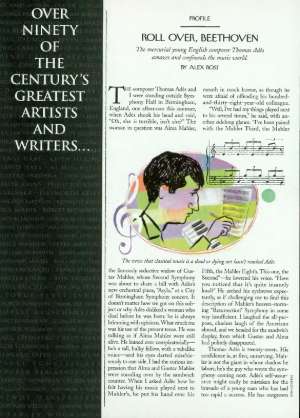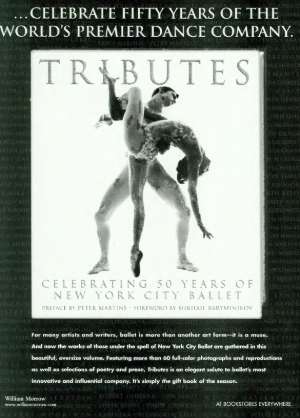Roll Over, Beethoven (original) (raw)
The New Yorker, October 26, 1998 P. 110
PROFILE of English composer Thomas Ades, 27. The writer spoke with British composer Thomas Ades last summer right before his new orchestral piece, "Asyla," debuted at a City of Birmingham Symphony concert. They met at Symphony Hall in Birmingham, England, and spoke about Gustav Mahler, whose Second Symphony is sharing the bill with "Asyla." Ades is 27 and unnervingly confident. For several years, he has been the enfant terrible of the classical music world, but the writer claims he has become one of the most imposing figures in contemporary classical music. His works are performed around the world, and his first opera, "Powder Her Face," is due to debut at the Brooklyn Academy of Music in December. The writer describes Ades as guarded and intellectual, but also sweet and entertaining. He seems equally at home in the rarefied world of classical music and the mainstream world of pop music and culture. Ades has been notorious in the past for making controversial critical statements about established and well-loved musicians. The writer calls him "one of the most original composers of our time." Unlike many other composers, Ades refuses to acknowledge the primacy of the past. He begins his pieces with evocative sounds which resemble noise more than they do music. Then he starts tracing motifs and patterns. The writer described the Birmingham performance as a contrast between the two distinct personalities of Mahler and Ades, and it produced in him a severe case of envy of English music. London's classical music scene is part of the heart of the city, as opposed to the isolated elitism of America's. Ades gained attention almost overnight: he was first noticed in 1993, and by 1995 he was being celebrated with an opera premiere at the prestigious Cheltenham Festival, a Composer Portrait concert at the Aldeburgh Festival, and a performance at the BBC Proms. The writer describes the history of British composing and discusses various important British composers. The writer attributes the popularity of classical music in Britain to the classical vocabulary that students are taught in schools. People in Britain seem more engaged in classical concerts, and the concerts themselves are cheaper than in America. The writer spoke with young composers George Benjamin and Julian Anderson about the British classical scene. They named as their largest benefactor the BBC's classical outlet, Radio 3, which has slid somewhat in quality, but still remains the best classical radio in the world. The writer describes a recent effort at BBC 3 to prevent the "dumbing down" of the station. The writer describes Ades's family history. His father translates modern and ancient languages and his mother is a noted authority on Spanish art and Surrealism; he has two younger brothers. Ades studied at the Guildhall School of Music, in London. In 1989, he won 2nd prize as a pianist in the BBC Young Musician of the Year competition. The writer describes some of Ades's pieces, including Opus 2, his Chamber Symphony. Characteristic of Ades's music are seemingly unconnected elements moving together in a kind of many-footed Chinese-dragon motion. With only 2 works down on paper, Ades was taken on by the small but elite publisher Faber Music. Before long, Ades was at work on his 1st opera, "Powder Her Face," a graphically sexual tale about the Duchess of Argyll, whose divorce from the Duke caused a scandal in 1963. This opera put Ades at the forefront of English composers. He received a commission for a major opera to be given at Covent Garden, in 2001. He has continued his piano career, taken up conducting, succeeded Knussen as the artistic director of the Aldeburgh Festival, become the director of the Birmingham Contemporary Music Group, and signed with the EMI label. The writer describes an incident last summer when Ades checked himself into the hospital after he had tried to replicate by hand the computerized patterns of techno music. The writer describes each movement of "Asyla," focusing particularly on the 3rd movement, "Ecstasio," which depicts a night out in a London club which resembles a scene from Alan Hollinghurst's new novel, "The Spell." The writer describes his sense of identification with Ades's music.

